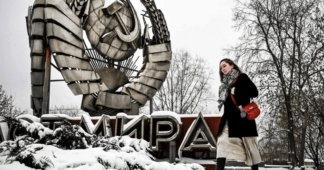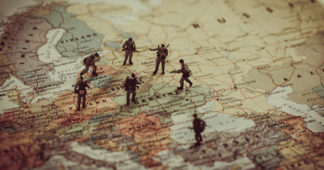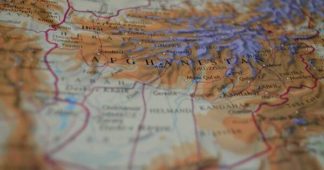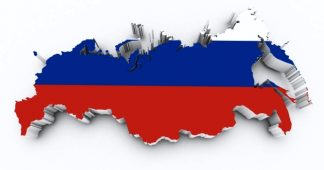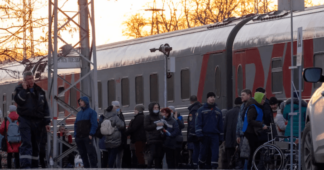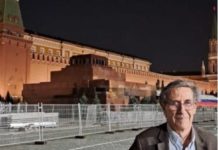Peace activists Abby Martin and Brian Becker sat down for a discussion about the Russia-Ukraine conflict, directed at the anti-war movement
March 01, 2022
Recent developments in Ukraine have shocked and devastated people across the globe, and posed a significant obstacle to all those around the world that fight for peace. Anti-war activists and people’s movements have, for the past few months, attempted to expose how the United States and NATO have contributed to increasing tensions in Russia and Ukraine. Many mainstream analyzes of the situation today seek to undercut the historic role of NATO and the US and shift the blame solely to Russia.
Long-time anti-war activist Brian Becker of ANSWER Coalition (Act Now to Stop War and End Racism) joined filmmaker and anti-imperialist Abby Martin of The Empire Files in a thorough discussion on the context and historical background of NATO and the crisis in Ukraine. Martin and Becker, peace activists who organize in the “belly of the beast”, the United States, aimed to help provide the anti-war movement with the necessary information to win over the global working class towards the side of peace. Martin oriented the discussion with the key questions of: “How did we get here? Where do we go from here? And what do we need to know as people in this movement who oppose war and want to call for peace?”
What led to this conflict?
Soviet Union dissolves, NATO breaks promises
Brian Becker, who has been an activist against war since the US war against Vietnam, began the discussion by providing important historical context. When the Soviet Union existed, the power of the coalition of socialist countries was able to counterbalance the power of the imperialist camp, led by the United States. This equilibrium hinged on a key piece: the nuclear armament of both the Soviet Union and the US. Neither world power could win a war against the other, as each possessed catastrophically destructive weapons.
As Becker said, “That doesn’t mean that there weren’t wars…There was the Vietnam War, the Korean War. You could go on and on, but there wasn’t sort of a repeat of WWII or WWI, where in the case of World War II, 100 million human beings were killed in a matter of five or six years, and the whole existing world order was basically shattered and left in ruins by 1945.”
However, after the Soviet Union dissolved in 1991, the United States’ foreign policy dramatically shifted. “The United States policymakers, starting in 1991, established what eventually became the neo-con[servative] consensus position that the United States would be able to exercise unipolar authority over the rest of the world,” Becker stated.
The North Atlantic Treaty Organization (NATO), formed by imperialist powers after WWII to stop the spread of world socialism, did not disband after the fall of the socialist camp. Instead, NATO expanded into former Soviet republics in Eastern Europe, which presented acute security concerns to the newly capitalist Russian Federation. This expansion came despite the assurances by the US to the USSR that “not an inch of NATO’s present military jurisdiction will spread in an eastern direction.”
NATO did not stop at expanding eastward. Without the counterbalance of the Soviet Union, the US and NATO decided to “destroy all of the governments whose origin was rooted in the anti-colonial projects of the post-WWII era, the countries that had looked at the socialist camp even if they weren’t part of it, they looked to it for military, economic and diplomatic support” as Becker described. These countries included Iraq, Libya, and Syria, all of which the US and NATO attacked. Although Russia did not intervene during the pillaging and destruction of Iraq and Libya, finally the Federation did step in when the United States was determined to overthrow the Assad government in Syria. As Becker described, the Russian forces, Syrian Arab Army, and Hezbollah were able to “turn the tide” against the US offensive.
Ukraine at the heart of NATO expansion question
In this context, the one red line that the Russian Federation has consistently held is that Ukraine must not join NATO. As Becker put it, Russia is firm in their conviction that “the Black Sea naval base that Russia has in Crimea, which is their biggest base, is not going to be a NATO base with nuclear weapons against Russia.”
However, the US government, which as Becker described, is “addicted to war”, has seemed determined to cross this line in the sand. The United States supported the 2014 coup against Ukrainian President Viktor Yanukovych, in which openly identified fascists seized power in Ukraine after months of protest. These fascists in Ukraine wanted the country to join NATO, because they knew that the United States would support them if they did. As Becker pointed out, “The United States government policy isn’t historically an anti-fascist policy when it comes to foreign policy. I mean, the US will work with any force, including the most right-wing fascist forces…So the fascists know the US is willing to play ball with fascism as long as they do America’s bidding.”
Since the 2014 coup, the political power of the fascists in Ukraine has waned. However, the United States and NATO has since then consistently imported weapons into Ukraine, including to the Ukrainian forces fighting the Russian-backed separatists in Donetsk and Luhansk. Abby Martin described: “The toppling of the government didn’t mark the end of the violence…for people who are living in these disputed regions, which was Donetsk and Luhansk that Donbass is central to, that fighting never stopped.”
According to Becker, weapons sales from the US and NATO to Ukraine make Ukraine a de facto member of NATO, “from the point of view of the Russian government” violating Russia’s stated concern and “red line” that Ukraine should not join the alliance.
Why did Russia decide to invade Ukraine?
“The Putin government in Russia has decided that the era of appeasement with the West has ended, and they’re going to use military force to recreate a buffer zone for what they think is necessary for Russian security,” Becker delineated as the reason behind Putin’s invasion. Martin corroborated, “It’s about Russia stepping in and saying, we’re not going to f*cking take this anymore.”
Russian president Vladmir Putin, in an address on February 21, gave several justifications for the invasion of Ukraine. One key reason was the “denazification” of Ukraine, in which, in 2014, fascists seized power. However, as Martin warns, “I think it’s important to not reflexively take the PR of a huge capitalist country.” The influence of the fascist elements in the Ukrainian state has waned considerably. Becker states, “Ukraine in the main is not Nazi…in the 2019 parliamentary elections, the political forces who formed a united right bloc, which are the fascist forces, they got about 2.1% of the vote.”
As Becker explained, the true purpose of the Russian invasion is for Russia to signal to the US and NATO that “the appeasement has ended” in terms of allowing NATO influence to inch closer and closer to Russian territory. However, while these are valid security concerns, both Martin and Becker agree that the invasion should be condemned. The invasion is a disaster to both the Ukrainian and Russian population, who under the Soviet Union, were “one people…working together against fascism”.
Why is the US fueling conflict in Ukraine?
At the root of the current conflict in Ukraine, is the escalation in tensions on the part of the US and NATO. NATO has consistently chosen to escalate and attempt to move closer to Russian territory, despite not allowing Russia to join NATO itself. As Becker described, “if [the Russian Federation] had been admitted into the imperialist club, they would have been glad to join at a certain point.” Martin added that Russia “would have [joined NATO] if they were invited”. If this is the case, why did the United States not allow Russia, a powerful capitalist country, to peacefully join NATO? Why choose confrontation instead?
Becker argued that “If the United States treats Russia as an equal because it’s now a capitalist led country, then Germany and other countries in Europe will gravitate in the direction of Russia. They are the natural trading partners and political partners, especially Germany.” The central reason to the US taking an antagonistic, rather than cooperative approach to capitalist Russia is that “the US fears the loss of its hegemony” in Europe.
The United States has consistently chosen the escalation of conflict, choices which have led to the devastating invasion of Ukraine.
What is the solution?
A central demand of the US anti-war movement has been to “disband NATO”. “[NATO] is not an anti-fascist alliance, it’s an anti-communist, anti-socialist, anti-worker alliance,” Becker states, articulating, “NATO is foundationally an offensive military alliance. It was designed to stop the spread of socialism. It was designed to make Western Europe basically under the complete subjugation of American imperialism.” As an offensive alliance, NATO does not stop conflict, only fuels it, as can be seen in places like Libya, Iraq, and Syria. If any country does not play by the US and NATO’s rules, “the Americans view that as an existential threat because it’s like the mafia. They say, ‘Well, if this country can show that it’s neutral, that it’s independent, that it’s not following the empire, that might suggest to others that they too could be independent.’”
However, even if NATO is disbanded and US hegemony ends, a multipolar world is not necessarily the solution. Becker explained, “We had a multipolar world all the way up until WWII. What did it bring us? The multipolar world brought us WWI, the multipolar world brought us WWII.”
“The only solution is not multipolarity. The only solution is socialism…it’s a system that doesn’t require war because it’s not based on competition. It’s based on human cooperation between people at home and people all over the world.”
How do we prepare for what’s next?
As an anti-war activist, Becker offers advice for the peace movement. Becker is the director of the ANSWER Coalition, which was founded three days after the September 11th attacks in order to oppose the US drive for war. Initially, people in the US responded with disdain. According to him, “at first people spat upon us. I mean, we were really isolated.” But he added, “over time, that dissipates…Over time, people will see that what we’re saying is actually true, even though at the moment it’s going to be very, very hard. So we have to stick to our principles. We have to look for opportunities to do public education against war and militarism.”
Becker articulated that it is important for the anti-war left to “win the battle of ideas” against media and government propaganda that is advocating for war. “The war danger, which emanates from here in the United States, is premised on the justification and rationale provided to the American people by the establishment and echoed by the media.” According to Becker, if anti-war activists dedicate themselves to winning over the US working class, the likelihood of an even more devastating confrontation will decrease. He added, “By winning working class and poor people over to our side, by carrying out that kind of political education, we build a mighty force that can actually make change.”
Published at peoplesdispatch.org
We remind our readers that publication of articles on our site does not mean that we agree with what is written. Our policy is to publish anything which we consider of interest, so as to assist our readers in forming their opinions. Sometimes we even publish articles with which we totally disagree, since we believe it is important for our readers to be informed on as wide a spectrum of views as possible.
